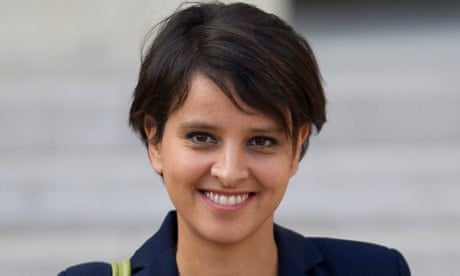The French parliament has been asked to approve a wide-ranging bill enforcing egalité for women in their personal and professional lives.
The ambitious legislation covers a multitude of issues including paternity leave, the portrayal of women in the media, the banning of Mini-Miss child beauty pageants, as well as wage equality and the gender balance on company boards.
A clause dropping the requirement that women seeking to terminate an unwanted pregnancy prove they are "in distress" provoked angry demonstrations from anti-abortion campaigners at the weekend. France's abortion limit of 12 weeks – compared to 24 weeks in the UK – will remain.
The minister for women's rights, Najat Vallaud-Belkacem, said the legislation was not a war of the sexes but an attempt to attack all inequalities.
"Until now we've had specific laws, but this time we're attacking all those inequalities that persist. It's by addressing them all together that we will combat them better. Also this new law will plug the holes in the current laws and make sure that previous legislation is applied," she said.
"I don't believe that history is going to spontaneously take us forward, so going towards more equality needs us to be politically proactive."
In response to the thousands of anti-abortion campaigners who took to the streets of Paris on Sunday, the minister said the term "in distress" was obsolete. "This might seem merely symbolic, but it's a strong message. Women must have the right to choose whether to continue a pregnancy without having to justify themselves."
France's Socialist government was prompted to sponsor equality legislation after figures showed that French women earn 25% less than their male colleagues; that 23% of the CAC40 (French stock exchange) company board members are women; and that one in seven of France's 36,500 mayors are female.
Officials have used existing legislation to threaten 500 companies with financial penalties if they do not appoint more female board members, and five have already been fined several thousand euros. The new law will prevent companies that do not adhere to the equality measures from bidding for public contracts.
Faced with accusations that MPs should put their own house in order and clamp down on political parties that prefer to incur fines than field female candidates – only 155 of France's 577 MPs are women – the law proposes to double the financial penalties levied.
"No longer will they be able to hide behind phrases like, 'but we can't find women', or 'they don't want [to stand]'," wrote Libération newspaper.
Even public theatres, sports federations, chambers of commerce and farming associations, described by Libération as "nests of testosterone", are targeted and will be expected to appoint an equal number of women by 2020.
New fathers, only 4% of whom take time off after the birth of their child, will be encouraged to take paternity leave and given time off to attend three medical examinations with their partner.
Girls under the age of 13 will be banned from taking part in beauty pageants, in response to concerns over what one government report called the "hyper-sexualisation" of children.
Supporting the bill in the Sénat, the upper house of parliament, last year, the centre-right former sports minister Chantal Jouanno said: "Let us not make our girls believe from an early age that their only value is their appearance."
The proposed parity law was passed by the Sénat in September and is being debated on Monday afternoon in the Assemblée Nationale, the lower house, where the Socialist government has a large majority.
"Because inequalities are everywhere, we're having to act everywhere," Vallaud-Belkacem told Libération. "We're not here to start a war of the sexes, we have a historic responsibility to accelerate the path towards equality."





